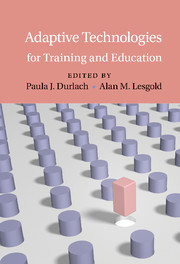ADAPTIVE TECHNOLOGIES
Our systems are now restored following recent technical disruption, and we’re working hard to catch up on publishing. We apologise for the inconvenience caused. Find out more: https://www.cambridge.org/universitypress/about-us/news-and-blogs/cambridge-university-press-publishing-update-following-technical-disruptionSkip to main contentAccessibility help
We use cookies to distinguish you from other users and to provide you with a better experience on our websites. Close this message to accept cookies or find out how to manage your cookie settings.

Products and Services
- Browse
- Services
- Open research
Institution LoginSearch
Adaptive Technologies for Training and Education
Search within full text

- Cited by 30
- Edited by Paula J. Durlach, US Army Research Institute, Alan M. Lesgold, University of Pittsburgh
Publisher:Cambridge University PressOnline publication date:March 2012Print publication year:2012Online ISBN:9781139049580DOI:https://doi.org/10.1017/CBO9781139049580Subjects:Computer Science, Computing and Society, Psychology, Educational Psychology
- 46.99 (USD)Digital access for individuals(PDF download and/or read online)Add to cart
- Export citation
- Buy a print copy
Actions for selected content:
- View selected items
- Save to my bookmarks
- Export citations
- Download PDF (zip)
- Save to Kindle
- Save to Dropbox
- Save to Google Drive
Contents
Page 1 of 2
Select Adaptive Technologies for Training and Education – Half title page
Select Adaptive Technologies for Training and Education – Title page
Select Copyright page
Select Contents
Select Figures
Select Tables
Select Contributors
- Contributorspp xi-xii
- By Vincent Aleven, Kevin D. Ashley, Marie Bienkowski, Ami E. Bolton, Peter Brusilovsky, Gwendolyn Campbell, Min Chi, Cristina Conati, Sidney D’Mello, Paula J. Durlach, John Flynn, Jared Freeman, LeeEllen Friedland, Cleotilde Gonzalez, Art Graesser, W. Lewis Johnson, Judy Kay, Kenneth R. Koedinger, Bob Kummerfeld, H. Chad Lane, Alan M. Lesgold, Georgiy Levchuk, Matthew Lineberry, Diane Litman, Collin Lynch, Phillip M. Mangos, Niels Pinkwart, Ido Roll, Wayne Shebilske, Valerie J. Shute, Eric A. Surface, Diana Tierney, Kurt VanLehn, Aaron M. Watson, Robert E. Wray, Diego Zapata-Rivera
Select Preface
Select Acknowledgments
Select Introduction
Select Part I – Adaptive Training Technology
Select Chapter 1 – Adaptive Educational Systems
Select Chapter 2 – Adaptive Expertise as Acceleration of Future Learning
- Chapter 2 – Adaptive Expertise as Acceleration of Future Learningpp 28-45
- A Case Study
- By Kurt VanLehn, Min Chi
Select Chapter 3 – Adaptive Hypermedia for Education and Training
Select Part II – Student Modeling Beyond Content Mastery
Select Chapter 4 – Progress in Assessment and Tutoring of Lifelong Learning Skills
- Chapter 4 – Progress in Assessment and Tutoring of Lifelong Learning Skillspp 69-95
- An Intelligent Tutor Agent that Helps Students Become Better Help Seekers
Select Chapter 5 – Student Modeling and Intelligent Tutoring Beyond Coached Problem Solving
Select Chapter 6 – Emotions during Learning with AutoTutor
Select Chapter 7 – Lifelong Learner Modeling
Select Part III – Experiential Learning and Ill-Defined Domains
Select Chapter 8 – Training Decisions from Experience with Decision-Making Games
Select Chapter 9 – Adaptive Tutoring Technologies and Ill-Defined Domains
Select Chapter 10 – Individualized Cultural and Social Skills Learning with Virtual Humans
Select Chapter 11 – Emergent Assessment Opportunities
- Chapter 11 – Emergent Assessment Opportunitiespp 222-235
- A Foundation for Configuring Adaptive Training Environments
Select Chapter 12 – Semantic Adaptive Training
Select Part IV – Natural Language Processing for Training
Select Chapter 13 – Speech and Language Processing for Adaptive Training
Select Chapter 14 – The Art and Science of Developing Intercultural Competence
Select Part V – Culminations
Select Chapter 15 – Practical Issues in the Deployment of New Training Technology
Page 1 of 2
Our Site
Our Platforms
Our Products
Join us online
LocationUpdate
Cambridge University Press 2024
